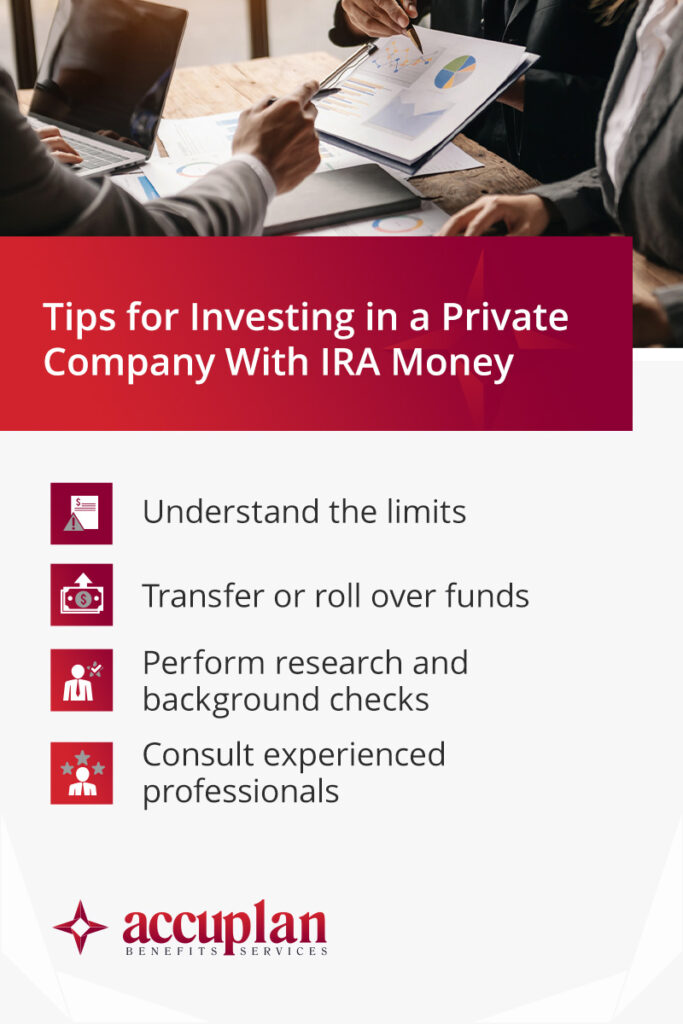
When you open an individual retirement account (IRA), you should understand the investment options available to you. Many Americans are aware that they can invest in stocks, mutual funds and bonds, but is investing in private companies possible with an IRA? If you have a retirement account, alternative assets can help diversify your retirement portfolio.
Unfortunately, few people seem to know about these alternative assets, which could explain why alternative investments are a small portion of the retirement account market. At Accuplan Benefits Services, we want to provide you with the information you need to make the most of your IRA and investments.
Can You Invest in a Private Company With Your IRA?
Yes, you can invest in a private company with your self-directed IRA. You can also choose to invest in startups, real estate and small businesses with a self-directed IRA. By making an IRA investment in a private company, you can take advantage of more investment opportunities and diversify your portfolio.

First, find the private company you want to invest in. As long as the business is not controlled or owned by you, your spouse, your descendant, your descendant’s spouse or any entity they control, you can invest in any company domestically or abroad. Your lawyer or broker, for example, cannot solicit you to purchase a share in their own company. However, you can invest in a fractional interest in a limited liability company (LLC), partnership or corporation. You can also choose to buy the private company.
Next, ask your custodian to make the investment. Note the counterparty and purchase price. If you are investing in a corporation, specify the number of shares. If you are investing in a partnership or an LLC, note the percentage of interest. Keep in mind that your IRA income represents your percentage of ownership. For example, if your IRA owns 20% of the company, your IRA should receive 20% of the income. After the transaction is complete, verify that it has been performed correctly.
For tax reporting purposes, the private company’s management should provide the fair market valuation on an annual basis, and it will be sent to the administration firm of your self-directed IRA. Some other legal considerations are that you may not invest in your own company with a self-directed IRA unless your total ownership or total ownership from disqualified persons like your family members is less than 50%. If you are a managing member, you should also ensure you are a less than 10% interest owner.
Understanding the Private Investment Landscape
Before we get into the details of the types of private companies you can invest in, risks and best practices, let’s explore how to invest in a private company. The private investment landscape concerning private companies involves various key players. For instance, you have the custodian of your self-directed IRA account who holds and administers the assets in your account. As the account owner, you may then choose your investments as long as they are within Internal Revenue Service (IRS) rules.
Private companies like startups and small businesses are often looking for capital to help fund strategic initiatives and business growth, making them an excellent investment choice for your self-directed IRA. Types of investors who might help these entrepreneurs include:
- Angel investors: An angel investor is often a well-off individual who invests their own money into the company.
- Venture capitalists: A venture capitalist is typically a business professional who packages their investment into funds through alternative assets.
While you can choose to be either of these types of investors, an angel investor is generally less involved with company operations, while venture capitalists may want some level of involvement in operational decisions. In these cases, staying aware of shareholder and ownership restrictions is important to maintain compliance.
Additionally, the Securities Exchange Commission (SEC) mandates that investors be aware of private placement rules known as Regulation A and Regulation D when making self-directed IRA investments. Regulation A exempts registration for securities offered publicly for non-accredited investors looking to access company private placements. Regulation D allows businesses to privately offer up to $10 million in securities within a 12-month period without needing to register the offering to the SEC. Be sure to read through the SEC regulations before you begin your private IRA investment.
Advantages of Investing in Private Companies
Many investors choose to open a self-directed IRA for the advantages this investment account offers, including tax advantages and portfolio diversification.

- Tax advantages: A self-directed IRA offers the same tax advantages you can get from a standard IRA, such as tax-exempt or tax-deferred growth.
- Portfolio diversification: Diversifying your portfolio can help mitigate the risk to your retirement funds. By investing in private companies, you can disperse your money into asset classes other than paper assets, such as bonds and stocks. This protects your savings from significant loss.
- Growth potential: Private companies tend to have great potential for growth, especially startups. Compared to buying shares in a listed company, your return on investment can be higher, as there is more room for company growth. A private company is usually more agile than a PLC and can quickly change direction if concerns are raised.
To enjoy these benefits, consider investing in private companies with your IRA.
Difference Between Investing in Private Companies and Private Equity
With a self-directed IRA, you can invest in both private companies and private equity funds. Investing in a private company should not be confused with investing in private equity. Also known as investment in private placements, PPMs or private stock, you are investing in an entity that is privately held and not available to the public. Private company investments are a subset of private equity investments, and private equity is an umbrella term that covers investments in private companies, as well as other privately held entities.
Investments in private equity IRAs are typically made in:
- Startups
- Franchises
- Partnerships
- Private stock
- C corporations
- Small businesses
- Limited partnerships
- Equity crowdfunding
- Pooled investment funds
- Privately held hedge funds
- Limited liability companies (LLCs)
- Real estate investment trusts (REITs)
Private equity investments may let you control the portfolio and invest through a pooled investment fund or vehicle or directly in a company. Pooled investments generally allow you to invest in venture capital funds, private equity funds or funds of funds through a pooled investment vehicle. A direct investment allows you to put money into a private business and receive equity interests like common or preferred shares.
Whether you’re investing in private equity funds or a private company, such as an LLC, you may benefit from a valuable level of control and involvement. Investing in an LLC with your self-directed IRA may allow you to gain direct control over funds and make investment decisions on the LLC’s behalf. While this enables you to execute investment decisions more quickly, you should also perform thorough due diligence. Private equity investments also allow you more control over choosing your preferred investment with limited restrictions.
Types of Private Companies to Invest In
With a self-directed IRA, you can invest in different types of private companies. Here are some private companies you might invest in and what they might offer.
Startups
Startups can be an excellent self-directed IRA business investment due to their high-reward opportunities and explosive capital growth. However, there may be potentially high risks if you can’t see where the company’s industry and market are leading. For this reason, it is essential to research the industry and market and get a forecast on the company’s potential growth. You may make things easier by working with a knowledgeable and experienced professional to source reliable information for you.
Established Private Firms
Already established private firms may be an excellent investment because, unlike companies that have just started, you can thoroughly research whether the existing private firm is longstanding and still growing. This history makes it easier to choose a promising private company. Purchasing ownership of an existing private firm may help your self-directed IRA gain stable growth and consistent returns. Just be sure that your total ownership is less than 50% and that if you are an interest owner, it is less than 10%.
Small Businesses

Small businesses are another potentially safe option with high growth potential when you choose the correct one. Beyond simply receiving returns to the IRA account, you may be able to invest in a small business operating for a good cause and community impact, with your funds helping it continue reaching its goal.
A small business may also gain growth opportunities over the years to influence a longer life span. Again, speak with a knowledgeable professional to evaluate the situation and help you make an informed decision.
Restrictions on Private Company Investments for IRAs
Before you begin investing in private companies with your IRA, there are a few restrictions to consider.
- IRA must be self-directed: Your IRA must be self-directed. Several investment companies allow you to invest only in investments allowed by their platform, which doesn’t include private company investments. That’s why we offer self-directed IRAs at Accuplan Benefits Services, so you can choose to invest in a private company.
- IRAs cannot be invested in certain assets: An IRA cannot own shares of an S corporation or be invested in private stock you own, antiques, firearms, life insurance, some precious metals or life insurance.
- IRAs cannot be used for prohibited transactions: When you, a disqualified person or beneficiary, use your IRA improperly, this is known as a prohibited transaction. For example, you cannot borrow the money from your self-directed IRA to loan to yourself or buy a property with your IRA’s funds for personal use.
Custodian Requirements
It’s also essential to understand the role of your custodian in a self-directed IRA and further ensure compliance. Your custodian is meant to execute important tasks for you to help you avoid engaging in prohibited transactions. Some of their responsibilities during your alternative investments include:
- Receiving and executing trades as their client requests
- Monitoring and ensuring compliance with industry and IRS regulations
- Using industry knowledge and taking action to ensure your investments are compliant
- Completing administrative tasks, such as transaction processing, record keeping and account setup
While custodians can help ensure your investments are compliant, they may not offer advice on structuring your IRA portfolio and investing. This restriction makes it important to contact other professionals who may help you in these areas.
When choosing a suitable self-directed IRA custodian, check that they are knowledgeable about private equity and investing in private companies. Being up-to-date on the latest industry changes and IRS regulations may help your custodian ensure your investments stay compliant.
Risks and Rewards of Private Investments
As with any investment, there are risks involved in investing in a private company with your IRA money. Understanding the greater volatility and rewards of this investment can help you better weather the ups and downs.
Potential Rewards
Investing in a private company in its early stages can mean receiving higher returns if it garners explosive value and growth. Getting those high returns typically requires you to invest long before the public gains access since the company may be worth much more after it is public and popular than when it is still private.
Risks Involved
One risk of private company investments is the lack of SEC oversight. While public companies are heavily regulated, private companies have fewer reporting requirements, making it essential for investors to conduct thorough research to avoid business failure risks and fraud. These investments may also lack liquidity due to limited markets, extended holding periods and redemption restrictions. In some cases, choosing the wrong company may make it challenging to sell your investment when you retire.
Mitigation Strategies
Fortunately, there are some steps you can take to reduce your chances of running into fraud and other risks of private company investing:
- Conduct due diligence: In addition to what the company provides, conduct extra research on the market, competitors and management team backgrounds to verify and further contribute to your understanding of the company’s chances of success.
- Diversify your private investments: Rather than investing a large amount into one company, invest small amounts in multiple private businesses to avoid possibly losing all your investment money on one investment that went wrong.
- Ask questions: Ask critical questions, such as whether the seller is licensed, whether the investment is registered and how the rewards compare to the risks.
Tips for Investing in a Private Company With IRA Money

If you want to invest in a private company with IRA money, follow the tips below.
- Understand the limits: You need to invest according to IRS regulations. When you understand these regulations from the beginning, you can avoid any potential pitfalls.
- Transfer or roll over funds: If you want to invest in a private company, but you already have all of your funds invested in an IRA, you can transfer or roll over your funds to a self-direct IRA at Accuplan Benefits Services.
- Perform research and background checks: Complete industry research by identifying key players, trends and long-term forecasts to understand their earning potential. You may also survey the company for strengths and weaknesses.
- Consult experienced professionals: Connect with relevant professionals, such as lawyers, tax professionals and financial advisors, to help you evaluate the company and determine whether it is a valuable investment.
Contact Accuplan Benefits Services or Open an Account Today

At Accuplan Benefits Services, we offer a self-directed IRA. With a self-directed IRA, you can invest in more than the conventional options like stocks, mutual funds and bonds. Instead, you can choose to invest in what you’re passionate about. As long as you follow all IRS guidelines for investing, it is typically allowed in a self-directed IRA. Some popular alternative investments inside self-directed IRAs include:
- Loans
- Private equity
- Gold and silver
- Cryptocurrency
- Actual real estate, including rental and commercial properties
Opening a self-directed IRA account with Accuplan simply includes completing an application with your details, choosing a funding option and beginning the investing process from your account dashboard. Investing for retirement how you want has never been easier. Open an account or contact us at Accuplan today.
Disclaimer: This content is provided for informational and educational purposes only. It is not intended to provide, nor should it be depended upon for legal, investment, accounting or tax advice. We do not make guarantees regarding the applicability of the above information to your situation.